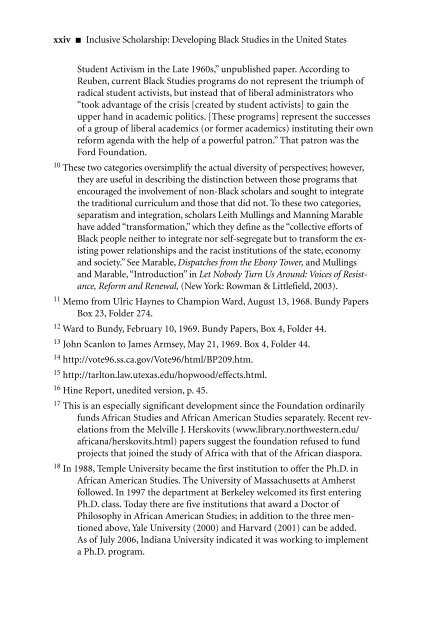Inclusive Scholarship: Developing Black Studies - Ford Foundation
Inclusive Scholarship: Developing Black Studies - Ford Foundation
Inclusive Scholarship: Developing Black Studies - Ford Foundation
You also want an ePaper? Increase the reach of your titles
YUMPU automatically turns print PDFs into web optimized ePapers that Google loves.
xxiv <strong>Inclusive</strong> <strong>Scholarship</strong>: <strong>Developing</strong> <strong>Black</strong> <strong>Studies</strong> in the United States<br />
Student Activism in the Late 1960s,” unpublished paper. According to<br />
Reuben, current <strong>Black</strong> <strong>Studies</strong> programs do not represent the triumph of<br />
radical student activists, but instead that of liberal administrators who<br />
“took advantage of the crisis [created by student activists] to gain the<br />
upper hand in academic politics. [These programs] represent the successes<br />
of a group of liberal academics (or former academics) instituting their own<br />
reform agenda with the help of a powerful patron.” That patron was the<br />
<strong>Ford</strong> <strong>Foundation</strong>.<br />
10 These two categories oversimplify the actual diversity of perspectives; however,<br />
they are useful in describing the distinction between those programs that<br />
encouraged the involvement of non-<strong>Black</strong> scholars and sought to integrate<br />
the traditional curriculum and those that did not. To these two categories,<br />
separatism and integration, scholars Leith Mullings and Manning Marable<br />
have added “transformation,” which they define as the “collective efforts of<br />
<strong>Black</strong> people neither to integrate nor self-segregate but to transform the existing<br />
power relationships and the racist institutions of the state, economy<br />
and society.” See Marable, Dispatches from the Ebony Tower, and Mullings<br />
and Marable, “Introduction” in Let Nobody Turn Us Around: Voices of Resistance,<br />
Reform and Renewal, (New York: Rowman & Littlefield, 2003).<br />
11 Memo from Ulric Haynes to Champion Ward, August 13, 1968. Bundy Papers<br />
Box 23, Folder 274.<br />
12 Ward to Bundy, February 10, 1969. Bundy Papers, Box 4, Folder 44.<br />
13 John Scanlon to James Armsey, May 21, 1969. Box 4, Folder 44.<br />
14 http://vote96.ss.ca.gov/Vote96/html/BP209.htm.<br />
15 http://tarlton.law.utexas.edu/hopwood/effects.html.<br />
16 Hine Report, unedited version, p. 45.<br />
17 This is an especially significant development since the <strong>Foundation</strong> ordinarily<br />
funds African <strong>Studies</strong> and African American <strong>Studies</strong> separately. Recent revelations<br />
from the Melville J. Herskovits (www.library.northwestern.edu/<br />
africana/herskovits.html) papers suggest the foundation refused to fund<br />
projects that joined the study of Africa with that of the African diaspora.<br />
18 In 1988, Temple University became the first institution to offer the Ph.D. in<br />
African American <strong>Studies</strong>. The University of Massachusetts at Amherst<br />
followed. In 1997 the department at Berkeley welcomed its first entering<br />
Ph.D. class. Today there are five institutions that award a Doctor of<br />
Philosophy in African American <strong>Studies</strong>; in addition to the three mentioned<br />
above, Yale University (2000) and Harvard (2001) can be added.<br />
As of July 2006, Indiana University indicated it was working to implement<br />
a Ph.D. program.

















